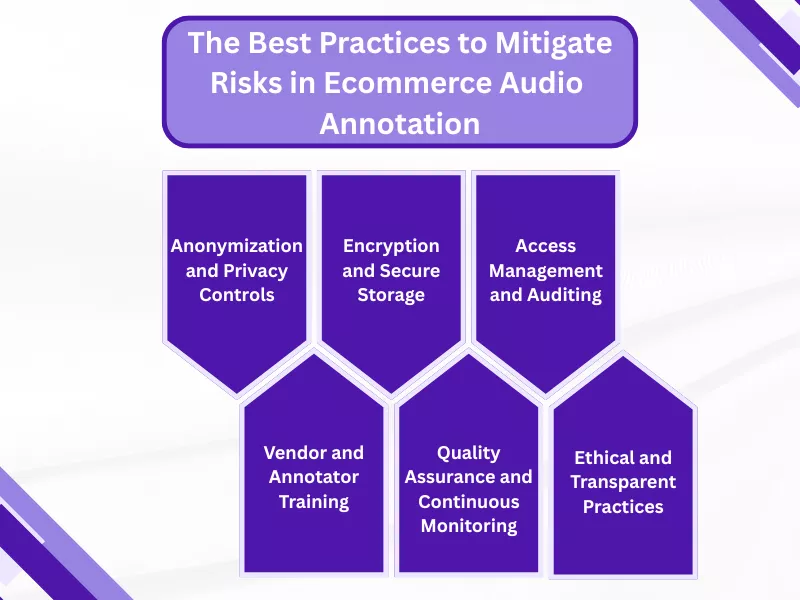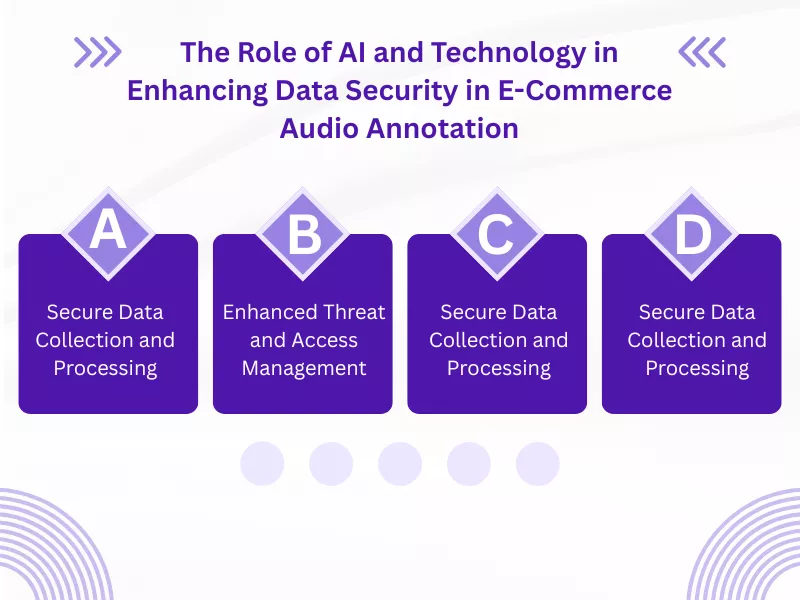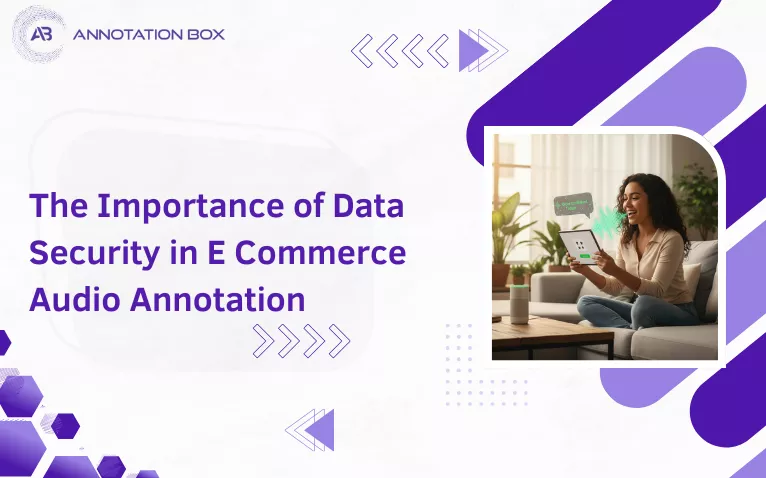You will relate to situations where you have used voice assistants to place an online order, or situations where you have called customer support and received the message ‘your call will be recorded for training purposes’ before being connected. All these are examples of how audio data is used for various purposes.
Ecommerce is one of the prime examples where audio data acts as primary data. Customers often use voice assistants to place orders or complete transactions. Since voice recordings and transactional conversations are sensitive information, it is crucial to implement strategies to ensure data security.
Here, we will help you understand the importance of data security in e commerce audio annotation.
Audio annotation is the process of labeling and adding metadata to audio recordings to make them understandable for AI and machine learning models. In e-commerce, it helps improve the customer experience, personalize recommendations, enhance search, and power voice assistants. There are different types of audio annotation, and each of them is important in e-commerce.
Data Security Risks in Ecommerce Audio Data Annotation
Data security concerns in ecommerce audio annotation can be attributed to the sensitive nature of audio data. Also, the involvement of human annotators adds to the risks. Let’s take you through a few key risks to help you understand why you must choose the right annotation service provider for the project:
A. Unauthorized Access
Accessing sensitive audio data using unsecured networks or personal devices can be risky. Such devices may lack adequate malware protection, leading to potential data breaches.
B. Data Leakage
Saving parts of the data, such as screenshots, and then sharing them via social media or email compromises data security in e commerce audio annotation. This increases the risk of exposure of confidential customer information.
C. Public or Insecure Work Environments
Carrying out the data labeling process in a potentially insecure or public location can lead to accidental exposure or interception of audio data.
D. Insufficient Security Training
If you have chosen a company where annotators do not have the necessary training and are unable to understand or follow security protocols, you will end up risking your data. This increases the risk of mistakes, thus leading to data leaks.
E. Lack of Security Certifications
There are numerous data annotation companies that might not hold relevant certifications. It raises concerns about their ability to securely handle sensitive audio datasets.
F. Privacy Violations
Audio data contains personally identifiable information (PII). Therefore, if they are not handled properly, they can lead to privacy breaches and legal consequences under data protection regulations like GDPR and CCPA regulations.
G. Biased or Inaccurate Annotations
Poor audio annotation process can lead to compromised model quality, thus affecting data integrity indirectly. The reasons behind such problems are generally rushed or unmonitored staff associated with less popular annotation companies.
H. Crowdsourcing Risks
In cases where annotation is crowdsourced, the chances of security risks increase due to the use of personal devices, less control over contributor environments, and potential for accidental disclosure or malicious use. This is a major reason you must avoid choosing companies that do not have in-house staff.
All these make data security in ecommerce annotation even more important. Further, it also increases the importance of availing the right data labeling services.
In the following section, we will take you through a few ways to mitigate such risks to ensure data security. These will also help you understand how reputed companies handle the risks associated with e commerce audio annotation.
The Best Practices to Mitigate Risks in Ecommerce Audio Annotation

It is necessary to learn about the best practices to ensure the safety and security of data in ecommerce audio annotation. Here are a few key ways to mitigate risks and ensure a safe and secure environment online:
A. Anonymization and Privacy Controls
One of the best ways to keep audio data safe and secure is by redacting or masking personally identifiable information from transcripts or audio clips before annotation or sharing. Also, it is necessary to obtain the necessary consent from the data subjects and ensure that the ways the data will be used are clear and transparent.
B. Encryption and Secure Storage
It is crucial to use end-to-end data encryption for audio files both during storage and transfer. Employing secure file transfer protocols is necessary to secure the data. Storing annotated data on a secure, access-controlled infrastructure can keep the data safe and secure.
C. Access Management and Auditing
Restricting access to customer data and managing it with role-based permissions is important to keep everything safe and secure. Further, it is also necessary to implement thorough audit trails to track data usage. Additionally, regularly reviewing and updating user access rights is crucial. Revoke access from people who are no longer involved in annotation.
D. Vendor and Annotator Training
You must avail audio annotation services from companies that are well-versed in the process and are compliant with major security certifications, such as ISO 27001, PCI DSS, GDPR, etc. Talk with the company to discuss the annotation guidelines, educate all annotators and staff regarding data security standards, potential data security threats, and privacy regulations.
E. Quality Assurance and Continuous Monitoring
It is necessary to implement proper QA processes for the verification of the accuracy of annotation and for the prevention of metadata leaks. Further, it is also important to conduct routine audits on annotation workflows and review security protocols periodically to adapt to new security threats.
F. Ethical and Transparent Practices
An effective way to avoid any data leaks and keep things secure is by creating a security and ethics-focused organizational culture by maintaining transparency in data handling and annotation purposes. Contributors and data subjects must understand and, if needed, challenge the ways their data is used and protected. This is one of the effective ways to overcome the ethical challenges in audio annotation.
This will help you understand how to keep audio data safe and secure. In the following section, we will take you through the ways AI and technology are improving data security for ecommerce audio annotation.
The Role of AI and Technology in Enhancing Data Security in E Commerce Audio Annotation

AI and technology have eased audio labeling. The tools can handle massive amounts of audio data for secure data collection and processing. Here’s a detailed insight into the ways AI and technology in enhancing data security in audio annotation in e-commerce:
A. Secure Data Collection and Processing
- Automated data cleansing – Artificial intelligence is capable of cleaning and standardizing audio data automatically. This ensures the data is accurate and consistent, which is crucial for proper annotation and AI model training. Since proper data preparation is a crucial part of audio annotation, this step holds a lot of importance.
- Anomaly detection – AI algorithms are able to identify unusual patterns or data deviations. This helps security teams work on potential breaches or unauthorized access attempts within the audio annotation workflow.
B. Enhanced Threat and Access Management
- Biometric authentication – AI can play a crucial role in improving biometric security techniques, thus providing stronger authentication for annotators and administrators accessing sensitive audio datasets.
- Vulnerability management – Artificial Intelligence can identify vulnerabilities within the network and security systems used for audio annotation. As a consequence, it helps in preventing cyber attacks before they happen.
C. Secure Annotation Workflows
- AI-assisted labeling – AI tools have the ability to pre-label audio, which is then reviewed and validated by human annotators. This approach helps reduce human error and increases efficiency while maintaining high security and data integrity.
- Data loss prevention – Integration of AI with audit trails can help companies monitor data alterations, prevent accidental or malicious data loss, and ensure the integrity of critical audio assets.
D. Data Integrity and Compliance
- Quality control – AI helps ensure consistent accuracy and quality of annotated data. This is important to train reliable ecommerce models and adhere to the regulations for data privacy in AI and e-commerce.
- Automated validation – AI can be used to validate data formats and content. This ensures that only accurate and secure data is fed into the annotation pipeline for training. This is an effective way for audio labeling for retail and e-commerce.
To End with
Creating a safe and secure environment online is crucial for ecommerce platforms. With AI audio data being at the center, it is crucial to implement ways to ensure the ecommerce data is completely safe and secure. Since customers use voice assistants to buy products or share sensitive information with customer support teams, companies must take extra steps for data protection.
Audio annotation makes AI and automated tools understand the data and process it properly. This makes audio annotation important for companies. They must avail services from a reputable company for accurate annotation.
Frequently Asked Questions
What is the importance of data security and privacy in ecommerce audio annotation?
The importance of data protection in audio annotation lies in making sure that sensitive information like voice recordings and transaction conversations, is protected throughout the annotation process. It helps in protecting customer data in ecommerce annotation and complies with data privacy regulations such as the General Data Protection Regulations (GDPR), HIPAA, etc.
Why is training data quality critical for AI-powered ecommerce applications?
Training data for machine learning and AI models in ecommerce is crucial. AI-powered systems like virtual assistants and chatbots require properly annotated audio data to understand customer requests accurately.
How can outsourcing audio annotation tasks impact data privacy and security?
Outsourcing an audio annotation project is crucial to ensure the process is done properly. However, it is necessary to find the right company to ensure adherence to security measures and security policies.
What security measures are essential when handling real-world audio data?
The main security measures for annotating audio include strong encryption, security controls like role-based access, continuous monitoring, and regular audits for protecting private data. Adding on, a layer of security using biometric authentication and secure transmission protocols can help mitigate various security risks.
What types of data are considered sensitive in e-commerce audio annotation?
Customer voice recordings, payment information, personal identifiers, and order details are considered sensitive data in e-commerce audio annotation.
How can an annotation tool ensure the security of audio data during labeling?
An annotation tool must have access control, data encryption, audit logs, and secure server configurations. It should prevent unauthorized downloads and anonymize data wherever possible for secure audio data labeling for e-commerce.
How can companies reduce the risk of data leaks in e-commerce audio annotation?
Companies can use encrypted data channels, two-factor authentication, controlled access levels, and AI tools for anomaly detection. Further, regular audits and staff training can help reduce data leakage. Also, companies need to be aware of data protection laws like the Payment Card Industry Data Security Standards to combat common security threats.
What does audio annotation involve in an era where data privacy is critical?
Audio annotation involves labeling sound segments while protecting personal information. The process uses anonymization, encryption and adheres to the regulatory guidelines to ensure efficient AI learning without risking privacy.
- Comparing Manual vs Automated Image Annotation: Which Is Better in 2026? - December 29, 2025
- How to Master Audio Data Labeling for AI Accuracy in 2026 - November 18, 2025
- The Importance of Data Security in E Commerce Audio Annotation - October 30, 2025






